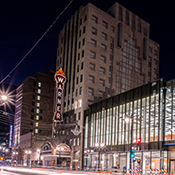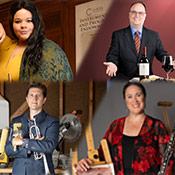
Starting Again: Ken-David Masur and the 2021 Virtual Season
Paul Kosidowski
PUBLISHED
Tagged Under: 2020.21 Season, MSO Notable
In the beginning, there is the oboe.
It’s the traditional first note of any orchestra concert—the “A” that allows the ensemble to tune up.
When the Milwaukee Symphony Orchestra opens its 2021 season, it will also start with the sound of an oboe. But instead of sounding a single note, MSO Principal Oboe Katherine Young Steele will play Georg Phillip Telemann’s Fantasy for Solo Oboe.
“In this space, what is the first thing I want to hear?” asks MSO Music Director Ken-David Masur over a Zoom call in early December. “Do I want this big splash? A big symphony? That misses what is important about this moment—that we are building from a seed. This is a moment when all of us are trying to start from nothing.”
It will be, after all, the first time the MSO has performed since March, when the COVID-19 pandemic forced the cancellation of all concerts. And it is the first time musicians will perform in the new Bradley Symphony Center, the orchestra’s new home.
“Mentally we are depleted,” Masur says of life during the pandemic. “We are fatigued in so many ways. Let’s start by warming up our imagination. In Telemann’s piece, the oboe fantasizes, trying to find an idea. And we’re also listening to what’s bouncing off the walls. What’s happening in this new space?”
That inaugural program continues with a rarely heard 1840 string quartet by Neils Gade, inspired by a love poem by Goethe. “Willkommen und Abscheid” (“Welcome and Farewell”) depicts a man riding through the dark and foreboding night to be with his loved one, and for Masur, it’s a fitting musical description of our journey out of the pandemic. “This is what we feel now,” he says, “I can’t wait until the moment when I can hug my loved ones again—when I can be with them again.”
This is no ordinary season, or course. Like other orchestras, the early concerts will feature smaller ensembles. As weeks go on, with vaccines gradually making it easier for musicians to gather together safely, the concerts will feature larger ensembles. All the concerts will be filmed and presented online for patrons to enjoy at home. And later in the season, there may be an opportunity for small, socially-distanced audiences to attend the concerts in person.
But listening to Masur talk about the opening program, it becomes clear that he does not see this “pandemic” season as a limited compromise. “This is not a downscaling,” he says. “For me, it was actually an opportunity to do some of the repertoire that we don’t regularly get to do. This includes composers who haven’t written for a large orchestra, but who have something very important to say.”
Expanding the season to include chamber music allows Masur to explore musical themes and connections in new ways. “We want to give people intriguing programs,” he says. “pieces that suggest themes that will engage their imagination before they set foot in the hall.”
Creating those intriguing connections means including a more diverse collection of composers, including women and people of color. For Masur, it’s a natural response to what’s happening in the country in recent years, and he sees this expansion of the repertoire as crucial to the future of music. “It’s a moment in time when I wanted to show myself that there is much more to find and explore than we’ve heard before,” he says. “A lot of my colleagues have expressed the same desire. So we all want to take this journey and find music that really moves you personally, but has not been performed.”
Doing so, Masur hopes to contribute to making diversity more normal in symphony programs. Artists, he says, don’t want to be known as “female composers” or “American composers.” They just want to be known as a composer. We want programs that can nurture people spiritually, in their hearts, without thinking about a composer’s race or creed or background. “Honoring that request for all composers is our goal.”
It’s part of the MSO’s commitment to Equity, Diversity and Inclusion (EDI), which is being supported by a Catalyst Grant from the League of American Orchestras. The grant supports wide-ranging programs throughout the MSO organization. For Masur, it’s all part of making music that’s “relevant to the conversation that needs to be had.”
“The question I ask myself is ‘Are we able to serve our audiences and our communities with this big range of ideas that we know music can offer?’ he explains. “We cannot be everything to everyone, but I truly believe that we can be part of the dialogue that is a constructive move forward. And I’m not just talking about current events. I’m talking about our basic need to connect on a human level.”
So while 2021 offers an MSO season that will be unlike any other, it isn’t simply a bridge to get back to the way things were. “We’re not talking about getting back to normal,” Masur says. “To an old normal. We’re trying to create a new normal.”



